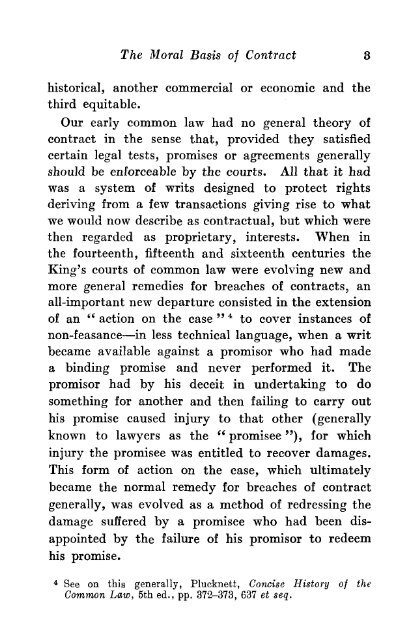The Sanctity of Contracts in English Law - College of Social ...
The Sanctity of Contracts in English Law - College of Social ...
The Sanctity of Contracts in English Law - College of Social ...
- No tags were found...
You also want an ePaper? Increase the reach of your titles
YUMPU automatically turns print PDFs into web optimized ePapers that Google loves.
<strong>The</strong> Moral Basis <strong>of</strong> Contract 3historical, another commercial or economic and thethird equitable.Our early common law had no general theory <strong>of</strong>contract <strong>in</strong> the sense that, provided they satisfiedcerta<strong>in</strong> legal tests, promises or agreements generallyshould be enforceable by the courts. All that it hadwas a system <strong>of</strong> writs designed to protect rightsderiv<strong>in</strong>g from a few transactions giv<strong>in</strong>g rise to whatwe would now describe as contractual, but which werethen regarded as proprietary, <strong>in</strong>terests. When <strong>in</strong>the fourteenth, fifteenth and sixteenth centuries theK<strong>in</strong>g's courts <strong>of</strong> common law were evolv<strong>in</strong>g new andmore general remedies for breaches <strong>of</strong> contracts, anall-important new departure consisted <strong>in</strong> the extension<strong>of</strong> an " action on the case " 4 to cover <strong>in</strong>stances <strong>of</strong>non-feasance—<strong>in</strong> less technical language, when a writbecame available aga<strong>in</strong>st a promisor who had madea b<strong>in</strong>d<strong>in</strong>g promise and never performed it. <strong>The</strong>promisor had by his deceit <strong>in</strong> undertak<strong>in</strong>g to dosometh<strong>in</strong>g for another and then fail<strong>in</strong>g to carry outhis promise caused <strong>in</strong>jury to that other (generallyknown to lawyers as the " promisee"), for which<strong>in</strong>jury the promisee was entitled to recover damages.This form <strong>of</strong> action on the case, which ultimatelybecame the normal remedy for breaches <strong>of</strong> contractgenerally, was evolved as a method <strong>of</strong> redress<strong>in</strong>g thedamage suffered by a promisee who had been disappo<strong>in</strong>tedby the failure <strong>of</strong> his promisor to redeemhis promise.4See on this generally, Pluoknett, Concise HistoryCommon <strong>Law</strong>, 5th ed., pp. 372-373, 637 et seq.<strong>of</strong> the
















